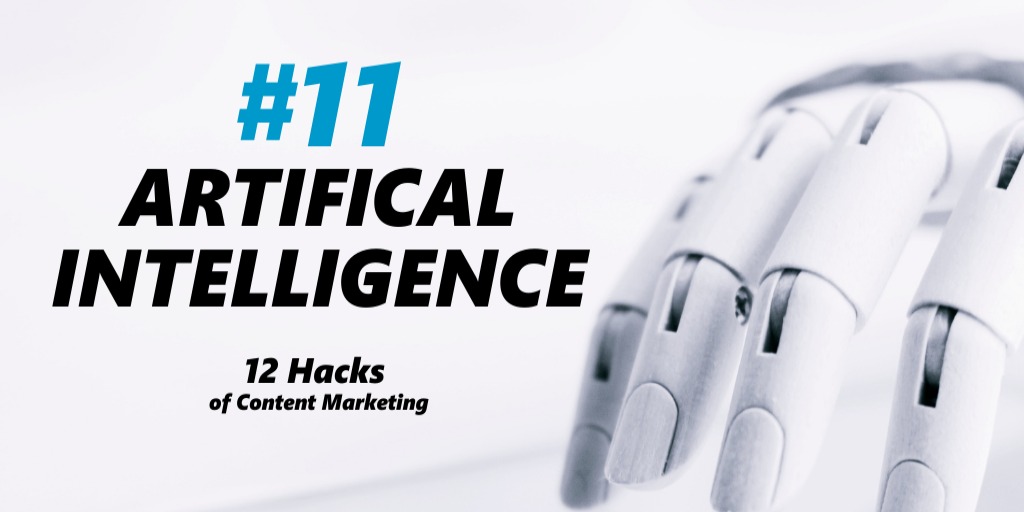12 Hacks of Content Marketing #11 Artificial Intelligence
Welcome to Day 11 and the penultimate episode of the 12 Hacks of Content Marketing series. Hopefully, you have established a wider growth hacking perspective thus far. Today, we’re focusing on an ever-growing and sophisticated concept, Artificial Intelligence (AI). AI is becoming more omnipresent each year. From Alexa to Netflix recommendations, from self-service checkouts to virtual shopping, we engage with AI more than we realise. With regards to ecommerce, AI is beginning to shape the customer’s online experience in a number of facets, some of which we will mention in this blog. According to the Salesforce State of Marketing Report 2020, 84% of marketers report using AI, up from 29% in 2018. By incorporating AI to your online business, you can join worldwide leaders like Amazon who thrive by taking advantage of AI to increase conversions.
Defining AI
AI is a broad concept that can be defined in several ways. You could say in a comprehensive manner that AI resembles machines imitating intelligent human behaviour. This connects with readers as voice assistants such as Alexa or Siri may spring to mind. Additionally, it is important to understand that AI is presented through both autonomous and adaptive systems that continue to evolve and improve their intelligence. AI is intended to assist and enhance human capabilities and contributions, not to replace them.
The Role of AI in Content Marketing
So how is AI used in ecommerce and what are its benefits to online businesses? Here a few cases of areas where AI is used in content marketing:
(1) Personalisation: Personalisation plays a significant role in customer satisfaction. According to Forrester, 77% of consumers have chosen, recommended, or paid more for a brand that provides a personalized service or experience. Personalisation is the ability to use mass and individual consumer data to create customised results for the user. For example, Netflix uses a multitude of machine learning and recommendation algorithms to drive personalisation and search experiences for each customer. In return, customer interests are more likely to be met and their loyalty is greater.
(2) Content Creation/Automation: AI can generate content ideas from using its extensive knowledge to determine strategies for more relevant and valuable content. AI helps marketers create content for their audiences that is unique to each stage of the marketing funnel. By implementing content that resonates with visitors, there is a greater likelihood of successful conversions.
(3) Predictions: Predictive analytics is a powerful tool that uses data mining, statistics, and modeling to predict future outcomes. When paired with AI, it can help businesses identify their potential audience and interpret their responses. Predictive intelligence not only anticipates trends, but can also aid with lead scoring. This process identifies using a points system where your prospects are in their buyer journey. As a result, specific content can be targeted to customers where they are most likely to engage with your brand.
(4) Natural Language Processing: NLP is an area of Artificial Intelligence which offers real-time content suggestions, allowing marketers to create targeted and personalized content. Here are some cases where NLG is used to assist marketers:
(a) Identifying brand awareness and reach
(b) Competitive analysis
(c) Chatbots
(d) Voice assistants
One common use of NLP across ecommerce is product recommendations. NLP takes into account factors such as previous search data and context. Amazon has highlighted how AI also plays a driving factors in its recommendation engine, generating 35% of the company’s revenue.
(5) Search Engine Optimisation: Producing and generating sufficient content is great, however one of your primary objectives should be improving content to rank higher in search engines. AI plays a key role in Google Search’ Rankbrain algorithm. Therefore, optimising your SEO can be done by keeping a broad perspective as everything from PPC, social media, blogs, Youtube all play their part in content optimisation. AI tools are readily available to help you optimise your website and its content to appear in page rankings. By merging these two disciplines, you can create a robust SEO strategy to get you noticed.
In conclusion, AI is only going to become a driving force in developing a successful content marketing strategy and positive user experience for customers. If customers' needs are satisfied, and AI can positively assist with conversions, then you should take full advantage of all the AI-based tools at your disposal.





